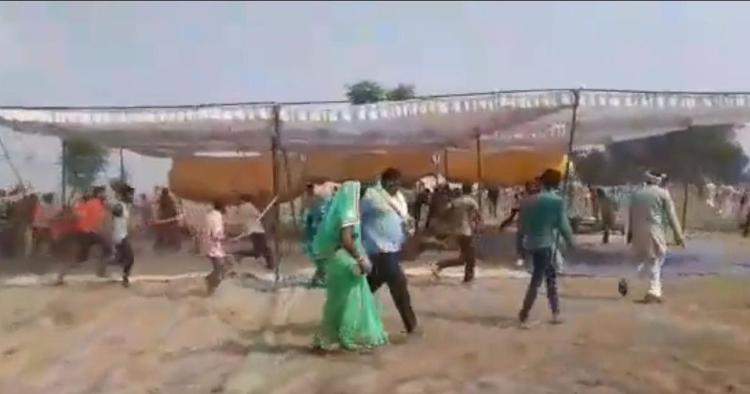Are India’s Right-Wing Forces on Road to Implosion?

Firing incident in Ballia, Uttar Pradesh. | Image: Twitter
Recent developments in Uttar Pradesh, including the firing incident in Ballia, are important pointers to the distinct possibility that the Right will implode from within. We have mostly understood the recent violent episodes as results of growing lawlessness in the state and the undermining of institutions. Both are very true, but the chaos could also lead to more conflicts and groupism within the Right.
While the Right feels that lawlessness allows them to undermine those who oppose it, such disorder is not going to stop after just tackling its adversaries. At some point, it will enter the organisational network of the Right. Once a cadre has been taught not to respect the rules and disallow any divergent opinion, there is no reason why such a political and organisational culture should stop at dealing with opponents. This is elementary knowledge that liberalism offers us.
India is witnessing a distinct moment in the breakdown of patron-client relations. This disruption is taking place without material equality. That is, only the values of post-patronage have spread, without power being shared or economic inequalities declining in any substantive way. This anomaly has given credence to the uncivil methods of the Right. For the moment, what the Right is doing signifies a breakdown of the “old order” and provides an optical illusion that a new order is being created. However, the Right itself has no such lofty ideal to usher in a new order: it is simply parasitically riding whatever the moment allows it to do.
In other words, there is an overlap between the breakdown of patronage—which the Dalit-Bahujan struggles made major contributions to—and the incivility of the Right. If its incivility was serving the purpose of further breaking down social hierarchies, then the Right would have played a different role. But when incivility is used simply to create a lawlessness that reinforces traditional caste and gender hierarchies, then the optics will eventually lead to external violence without accountability. And it will cause the internal implosion of right-wing organisations.
The incident in Ballia is only an initial signpost: Read along with it other incidents, such as the inexplicable event in 2018 wherein Pravin Togadia had complained of a possible threat to his life in Gujarat.
The RSS is known for discipline and organisational unity. It has not experienced splits and there is a fair degree of coordination within the many units of the Sangh. This notable achievement has contributed in an important way to the expansion of the Right in India. It is also remarkable that a large number of full-time cadres in the RSS work silently and anonymously without personal ambition, many sincerely believing the RSS to be working for a legitimate moral cause of empowering their religion and nation. How the Right manages this kind of internal discipline with external lawlessness needs closer study, but it is amply clear that when in power—whether in politics or handling institutions such as of higher education—the Right is based on utter disregard for rules and diversity of opinion. We can see that this disregard creates tension within the Right, which then gets expressed either through mutual disregard amongst those in the same camp, or it is “managed”, through extreme centralisation, surveillance, and fear—this is what we are witnessing in the way the government is being run today. To make all this work requires a leader with a larger-than-life cultivated image, like Prime Minister Narendra Modi, or someone ruthless like the Chief Minister of Uttar Pradesh, Yogi Adityanath.
Ruthlessness is often understood as a necessity to maintain discipline and preserve the moral fibre of society. But when ruthlessness morphs into sectoral fights, as we see breaking out in Uttar Pradesh between Brahmins and Thakurs (with the stage-managed encounter killing of gangster Vikas Dubey), then its moral pretences come under stress. All that remains then is the bare nakedness of lawlessness and the struggle for power exposed to the elements. It is at this stage that a clear possibility for internal implosion of the Right is created. This is sometimes visible, say, in the street-fights over ticket distribution. (It is a different matter that this is not specific to right-wing political parties.)
There is a distinct possibility that the weakening of the Right may not happen only through the counter-mobilisation by social struggles, but also through internal implosions or conflicts between its constituents. In the past, the Congress party managed political and social conflicts through its model of accommodation, but despite its efforts there were a series of splits in the party which led to Congress offshoots becoming regional parties. However, we may not witness such a smooth process when the internal clamour within the Right grows. For there is a paucity of opportunity and power has fossilised around castes and individuals. Therefore, discontents within the Right may not have the option to split and create alternative forums. Besides, even for doing this at least a semblance of respect or at least pragmatic understanding of diversity is necessary. But the way cadres—who will eventually become leaders—are trained, fosters within them a disdain and contempt for diversity. Besides, a split would be read as betrayal and disloyalty. This sense of being betrayed creates a righteous lawlessness and justification of criminality.
Right-wing organisations and political culture looks strong as long as the culture of lawlessness is targeted towards those who are at the margins or outside their networks. This is how it began within Uttar Pradesh too, but eventually the very logic and physiognomy of lawlessness will turn it inwards too. Conflict then becomes directionless and difficult to contain. That is why the recent developments in Uttar Pradesh are merely the initial signposts.
The culture of conspiracy, lies, unaccountability, recklessness and manipulation cannot be controlled or exclusively reserved for opponents from outside. It will seep into strategies of managing and side-lining opponents within as well. This is where the Right might feel the heat and find it difficult to bring matters under control. That said, it would have wreaked deep and grievous damage on society and institutions by then. Before the Right realises the consequences of the methods it employs, it would itself become a victims of its own strategies.
The author is associate professor, Centre for Political Studies, JNU. The views are personal.
Get the latest reports & analysis with people's perspective on Protests, movements & deep analytical videos, discussions of the current affairs in your Telegram app. Subscribe to NewsClick's Telegram channel & get Real-Time updates on stories, as they get published on our website.
























